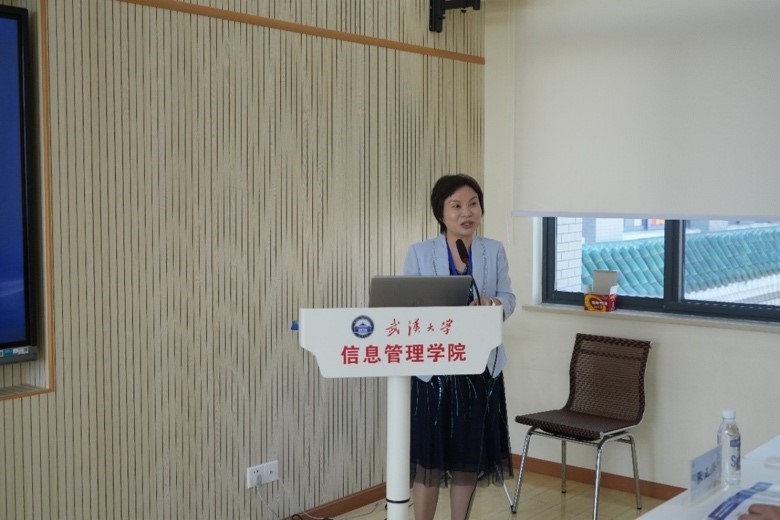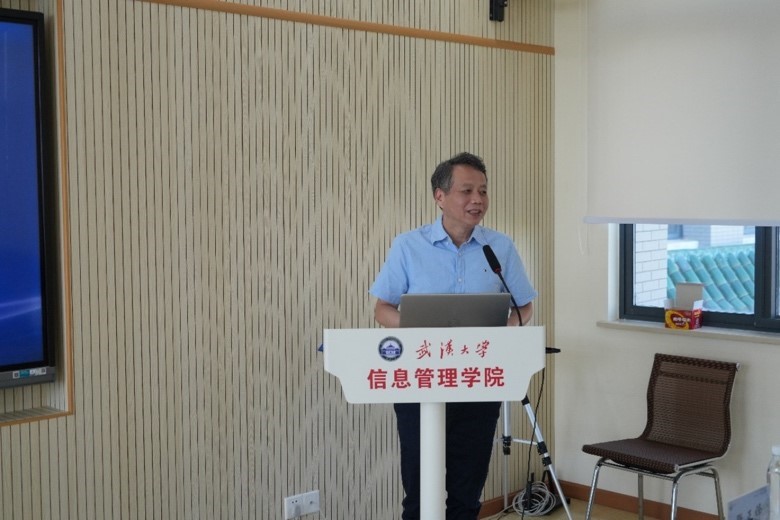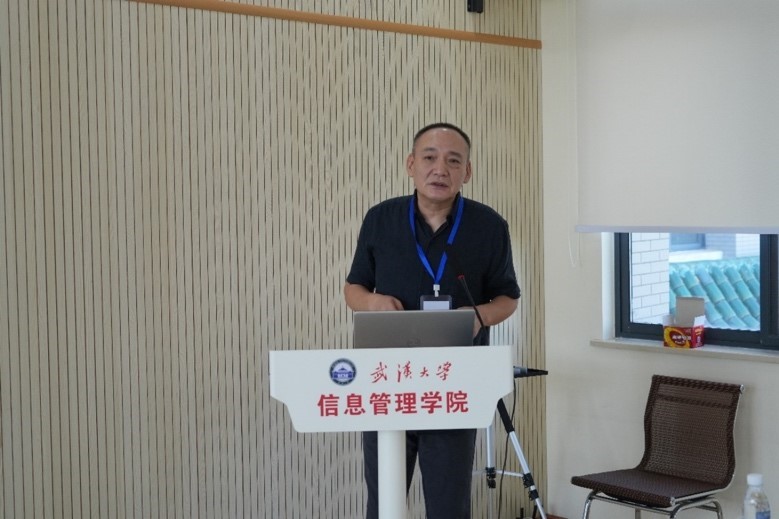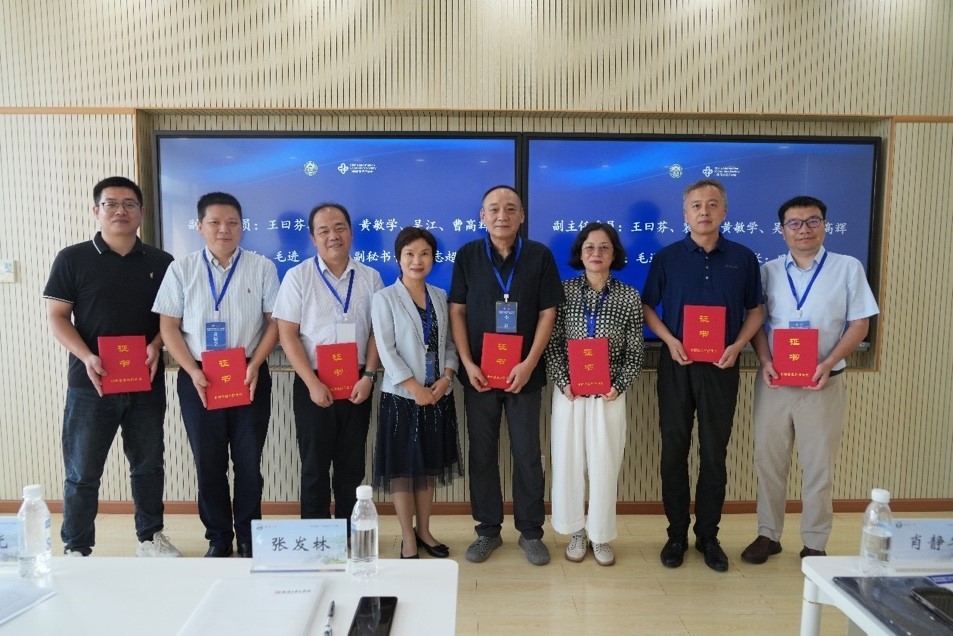On September 28th, the Yangtze River Forum on Digital Intelligence Empowering Industrial Innovation and Development and Inaugural Meeting of the Special Interest Group (SIG) on Data Intelligence and Industrial Innovation, China Information Economics Society, was held at our School.

Jinghua Xiao, Vice President and Secretary General of the China Information Economics Society, Professor at the School of Management, Sun Yat-sen University, pointed out that data intelligence, as a new driver of information economy development, is reshaping the industrial innovation model. The SIG will build a bridge between the research of information economics and the development of the industry, set a model and benchmark for the development and transformation of industrial innovation, and serve as an important think tank to promote the digital and intelligent transformation of China's industry, and contribute to the construction of a modern economic system and the realization of high-quality industrial development.

Falin Zhang, Associate Dean of the Academy of Humanities and Social Sciences, Wuhan University, said that the digital economy and data intelligence occupy a core position in the new era. He introduced Wuhan University's cutting-edge achievements in cultivation of talents with data intelligence and interdisciplinary integration, especially in the construction of "liberal arts with data intelligence", expecting the SIG to boost Industry-University-Research's cooperation and provide a cradle for talents with data intelligence and industrial innovation.

Xiaoguang Wang, Professor and Dean of our School said that as an important site of data intelligence research and education, the School of Information Management at Wuhan University will continue to promote scientific research innovation and personnel training, devote itself to theoretical breakthrough and application, actively respond to national strategic needs, and promote the transformation and upgrading of local industries. He expects that with the joint efforts and support of all walks of life, the SIG will better contribute intelligence and strength to promoting the deep integration of data intelligence and industrial innovation.

Gang Li, Vice President of China Information Economics Society, Dean of the Wuhan Data Intelligence Research Institute, Professor at our School, gave a report on the work of the SIG. He introduced the background, necessity, work scope, tasks and composition of the SIG, and indicated that the SIG would build a core technology system of "data+computing power+algorithm" to drive the "four-chain integration" of industrial chain, value chain, supply chain and innovation chain.

The SIG was approved in July 2024 to promote the construction of the basic theoretical system and methodology of data intelligence, and to empower local industries to transform and upgrade and high-quality economic development, and Gang Li serves as the first director.

In sessions of Yangtze River Forum on Digital Intelligence Empowering Industrial Innovation and Development, scholars presented as the followings:
Jinghua Xiao made a report entitled Human and AI Collaborate to Promote Digital Transformation and High-quality Development of Enterprises. She discussed how AI can promote digital transformation of enterprises and help high-quality development from a practical perspective.
Zhengfeng Zhang, GM of Beijing Wanfang Software Co., Ltd., gave a report entitled Activating the Value of Data Elements and Empowering the Development of Creative Quality Driven Productive Dynamic -- Application Practice of Wanfang Industrial S&T Innovation Service Platform. He started from three aspects: data elements, empowerment service and personalized cases, and emphasized the importance of activating the value of data elements with his own service experience.
Lei Pei, Professor and Dean of the School of Information Management, Nanjing University, made a report entitled Technology Empowers High-quality Development of Digital Economy -- Complexity Strategy of Policy-making Process: Method Intervention and Practical Enlightenment of Policy Simulation. He analyzed the complexity of policy information processing and its predication, and discussed how to effectively intervene and provide practical enlightenment.

Minxue Huang, Professor and Associate Dean of the Economics and Management School, Wuhan University, made a report entitled A Study on the Decision-making Mode of Digital Intelligence Scenes Enhanced by Human-Machine Collaboration, and proposed a paradigm of human-machine collaboration enhanced by combining machine automation paradigm and manual support paradigm, so as to realize the evolution of cognitive intelligence based on manual decision-making and flexible machine intelligence.
Yuefen Wang, Professor and Dean of Big Data Science Research Institute of Tianjin Normal University, made a report entitled Impact Factors of Patent Technology Transfer and its Spatial Heterogeneity Distribution under the TOE Framework: Taking the Biomedical Industry in China as an Example, aiming at exploring the impact factors of technology transfer and their effects by using linear and global regression methods, and providing decision-making ideas and reference for promoting the development of technology transfer in China.
Nengwei Yao, Founder of Linsheng Intelligent Technology Co., Ltd., made a report entitled Cognitive Computing Practice Based on Data and Knowledge Fusion, analyzed the underlying logic and practical issues of the integration of data intelligence and entity industry, and combed the landing path of cognitive computing engine from the perspective of industrial practice.
